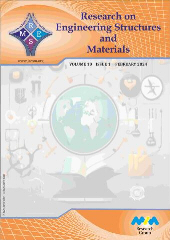Research Article
Physical and mechanical characteristics of lightweight POFA geopolymer concrete with timber clinker aggregate
Muhammad Nura Isa1, Hanizam Awang2, Tan Ying Yi2
1Faculty of Environmental Technology, Abubakar Tafawa Balewa University, Nigeria
2School of Housing, Building and Planning, Universiti Sains Malaysia, Malaysia
Keywords
Abstract
Wood ash lye;
POFA;
GGBS;
Timber clinker;
Geopolymer concrete;
Sustainable building materials
The construction industry is seeking sustainable alternatives to traditional Portland cement-based concrete due to its environmental impact. Geopolymer concrete, using industrial byproducts as binders, offers a solution by reducing emissions and improving durability. However, challenges such as costly activators and energy-intensive curing processes limit its adoption. This research investigates the properties of wood ash (WA) lye activated blended geopolymer concrete incorporating sustainable timber clinker aggregate (TCA). A fixed liquid-to-binder ratio of 0.5 and an alkaline activator ratio of 3.0 were used in the mix design. The study focused on replacing conventional coarse aggregates with TCA to enhance sustainability. Key analyses included physical, mechanical, durability, environmental and cost efficiency assessments. Results showed that the replacement of natural granite with TCA led to reduction in the density of the concrete from 2063.13kg/m³ to 1805.66kg/m³ for 0% and 100% TCA, respectively. Strength also decreased as TCA content rose, attributed to lower density. Water absorption increased with TCA content, though all samples stayed within the 10% absorption limit set by BS882: 1992. Notably, the TCA60 specimen met ASTM C330 (2009) requirements for structural lightweight aggregate concrete. The development of wood ash lye activated lightweight binary blended geopolymer concrete incorporating timber clinker aggregate represents a potentially groundbreaking advancement in sustainable construction materials.
© 2024 MIM Research Group. All rights reserved.

